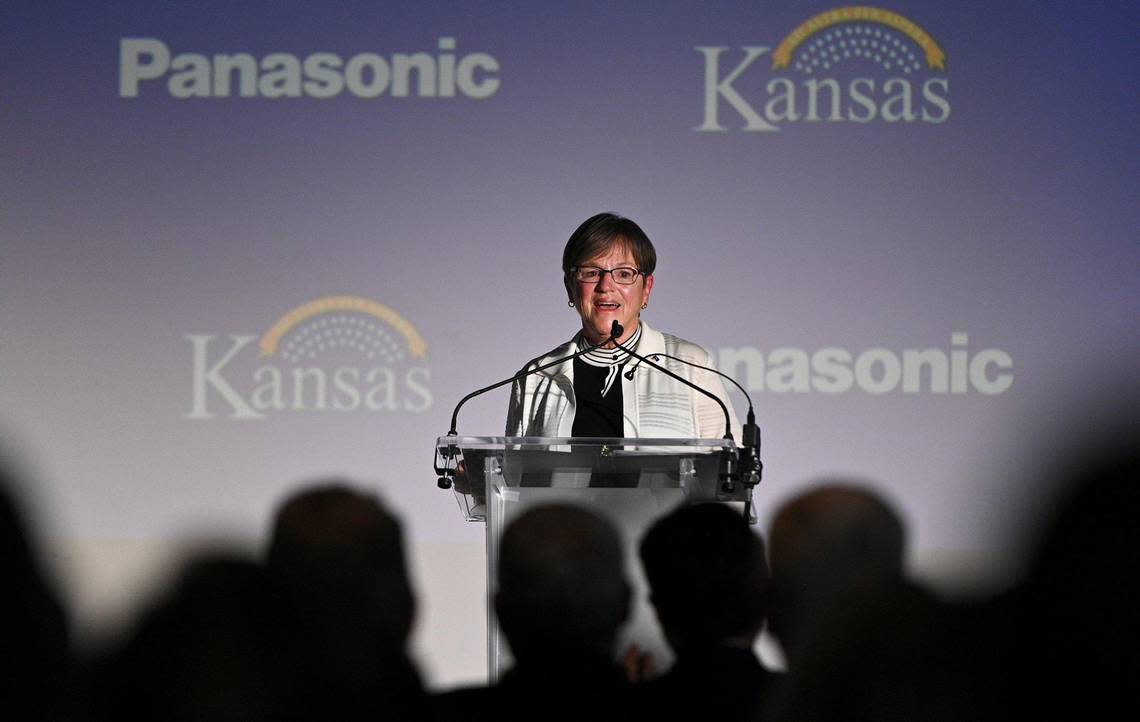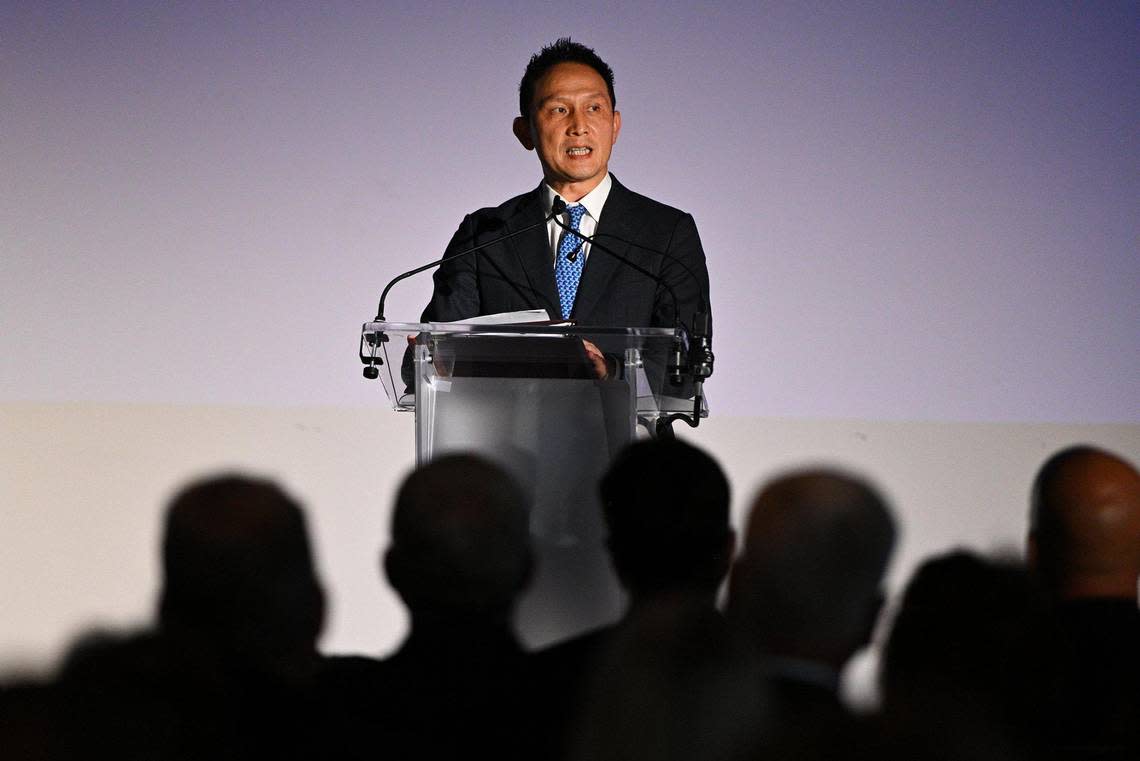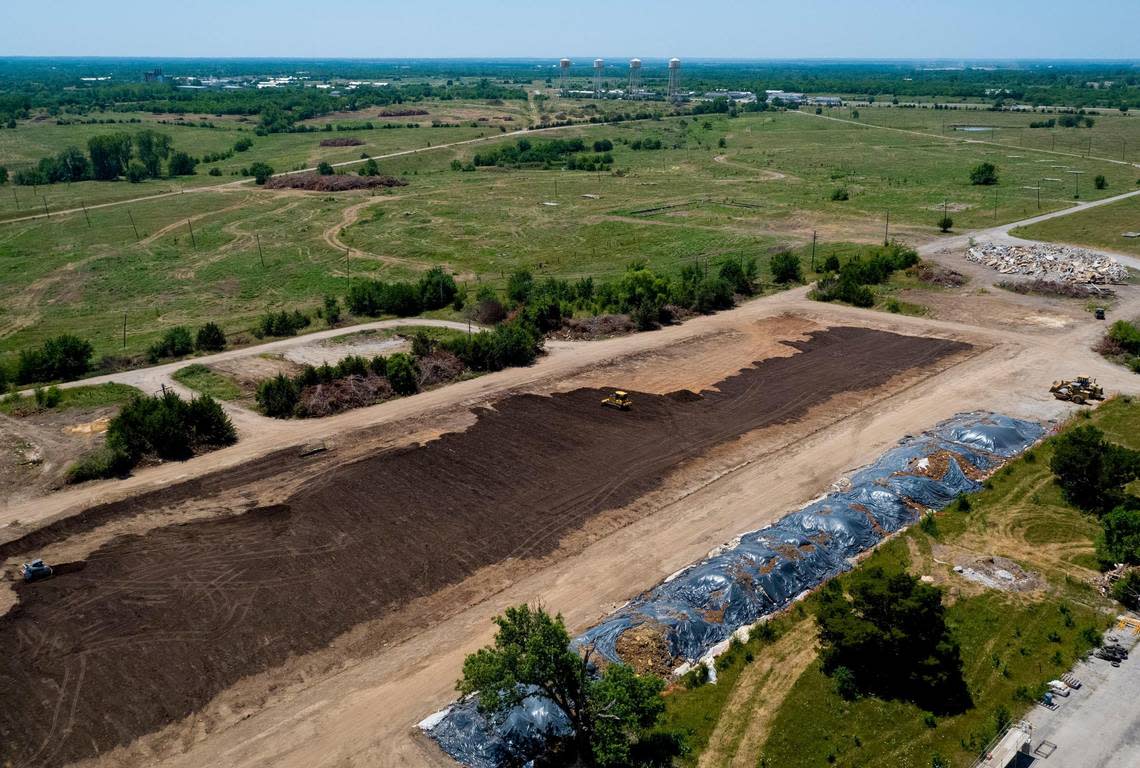Panasonic chooses Kansas for $4 billion mega battery factory, Gov. Kelly confirms
Panasonic plans to build a $4 billion, 4,000-employee factory in Kansas to make batteries for the rapidly growing electric vehicle market, Gov. Laura Kelly announced Wednesday.
The Japanese electronics giant is planning to invest several billion dollars for an electric vehicle battery factory in De Soto in Johnson County, Kelly confirmed late Wednesday afternoon in Topeka.
Earlier Wednesday afternoon, Kelly and legislative leaders met behind closed doors to approve an agreement with an undisclosed company using the state’s largest incentive program, which Kelly signed into law in February.
The Star previously reported that the factory would likely be located at the former Sunflower Ammunition plant in De Soto.
The announcement concludes a national search for a new site and a heated competition between state officials in Kansas and Oklahoma, the two finalists for the project. Leaders have previously said the factory could employ as many as 4,000 workers with average annual salaries of $50,000.
Panasonic has agreements to provide batteries for both Tesla and Toyota.

Kelly, a Democrat who has staked much of her reelection bid on economic development, championed an unprecedented incentive package to lure Panasonic. She convinced the Republican-led legislature to create the state’s largest ever subsidy program aimed at recruiting business investments of $1 billion or more.
Rough estimates from the non-partisan Kansas Legislative Research Department figured the project could cost Kansas some $1.3 billion in refundable tax credits, payroll tax incentives and training grants.
The fast-tracked legislation was passed in early February without mention of Panasonic, which pushed lawmakers and state officials to keep quiet through the use of nondisclosure agreements. Lawmakers worked through a snow storm to pass the legislation. Kelly’s administration told them time was of the essence as the company would make a decision in February and announce in March. Instead, five months passed after passage with no public word of Panasonic’s decision.

The Star was the first local news outlet to name Panasonic as the likely company behind the secretive legislation in February. In March, Japanese public broadcaster NHK reported that Pansonic planned to build a new American mega factory to produce a new type of electric battery for Tesla.
Panasonic will build its sprawling new factory just south of De Soto at the Sunflower Army Ammunition site. The U.S. Army has been working for years to clean up the World War II-era site, believed to be the largest undeveloped site in the Kansas City metro area.

While the Army’s cleanup efforts will continue for years, officials say more than 1,100 acres of the site are near shovel-ready and should receive their final state and federal environmental approvals soon.
In January, De Soto annexed 6,000 acres of the Sunflower site as it geared up for major redevelopment. The Sunflower plant sits south of K-10 between Lawrence and Olathe. The De Soto City Council approved the first step of a massive incentive package that will help the developer fund demolition and environmental cleanup.
Plans for tax increment financing were on a council agenda last week but held at the developer’s request, an official said. The council did approve a measure that reduces regulations on manufacturers of batteries and other electronics.
The Sunflower plant, closed since the early 1990s, produced gunpowder for World War II artillery shells and rocket propellants during the Korean and Vietnam conflicts. The work left thousands of acres laced with environmentally hazardous, even explosive, materials.
The Army has spent some $200 million to dig up sewer lines, remove contaminated foundations and truck out loads of unsafe soil. In 2019, Army officials told local residents that some contaminated materials were being burned on site to convert residual explosives into base elements like nitrogen and oxygen. Other debris has been hauled to landfills across Midwest and Southerns states rated for hazardous materials. Some structures and materials not deemed safety risks will stay on the property.
Officials have said that a large portion of the site has remained uncontaminated.
In the late 1990s, developers eyed the Sunflower plant for their quixotic plans to build an Oz Entertainment amusement park. But those plans fizzled and Sunflower Redevelopment Group acquired the land in 2005 from the Army with plans to tackle the cleanup within 10 years. The Army awarded a $109 million grant to remediate the 5,300 acres of contaminated land. But that money was exhausted by 2010 with the job far from complete.
The property languished for five years until the Army agreed to resume and take over the cleanup effort in 2015.
Oklahoma leaders respond
In late April, more than two months after Kansas passed its legislation, a bill that provided nearly $700 million worth of incentives headed to the desk of Oklahoma Gov. Kevin Stitt, a Republican.
Secrecy also defined the talks around the legislation in Oklahoma City, where lawmakers said little as they cited nondisclosure agreements.
Oklahoma officials sought to lure Panasonic to another World War II-era munitions site at the MidAmerica Industrial Park in Pryor, Oklahoma, about 45 miles outside of Tulsa.
Startup Canoo had previously committed to building a $400 million electric vehicle factory at the sprawling MidAmerica Industrial Park — ostensibly an advantage for the Oklahoma location given Panasonic’s agreement with Canoo. But that project is now in question as Canoo faces financial troubles and has warned investors of “substantial doubt” about its future.
After approval of the new incentive legislation, officials in Oklahoma’s Mayes County approved a new $300 million tax increment financing, or TIF, plan for the battery plant.
But that incentive is now uncertain as a group of voters filed a referendum petition to challenge the new TIF. The issue was set for a public vote in early November, but the petition is now being challenged in the courts. An Oklahoma judge is expected to weigh the challenge later this month.
The battle between Kansas and Oklahoma came as states increasingly compete for — and shower incentives on — electric vehicle plants and suppliers.
For example, Georgia last year approved what’s expected to be the largest incentive package in state history to lure a $5 billion Rivian electric vehicle plant.
Batteries make up nearly a third of the cost of building electric vehicles. And the EV industry is expected to continue its rapid rise in the coming years — General Motors, for instance, says it will only offer zero-emissions cars by 2035. Rapidly shifting consumer preferences for hybrids and electric vehicles has pushed legacy auto makers and upstarts to spend billions to perfect the technology and meet demand.
Osaka-based Panasonic has inked several agreements with vehicle makers. Aside from its recently announced deal with startup vehicle maker Canoo, the company created a joint venture with Toyota and plans to start making batteries at a new North Carolina plant by 2025. And Panasonic is expected to begin producing batteries for Elon Musk’s Tesla sometime next year.
Panasonic in 2020 announced plans to invest $100 million in battery production at Nevada’s Tesla plant. But in January, Panasonic said it would begin making batteries for Tesla in Japan after having trouble getting a large-scale battery plant online in the United States.
In pitching the new incentive program, Kansas officials made big promises about the Panasonic factory’s potential. The Kansas Department of Commerce has said the project would produce some 4,000 jobs paying about $50,000 per year as well as temporary construction employment for 6,000.
The federal Bureau of Labor Statistics reported an average hourly wage of $26.21 in May 2020 for workers in the metro area. For 40 hours per week at that rate, a worker would earn more than $54,000 per year.
The incentive package was controversial in the Legislature, earning critics and advocates on both sides of the aisle.
Democrats and Republicans aired frustrations that the state was offering too much money to a corporation without allowing the public to know where it would go.
These projects, they warned, could put Kansas’ budget at risk if the company didn’t deliver on its promises of economic stimulation.
But in a January interview, Kansas Lt. Gov. and Secretary of Commerce David Toland said the project would prove “transformative” if Kansas were to land it.
“It will supercharge the rate of growth in our state and have a positive ripple effect on small businesses, both in the region where the business locates and across the state,” Toland said. “It is of significant importance to the Kansas economy that we win this opportunity.”
The Star’s Jonathan Shorman contributed to this report
